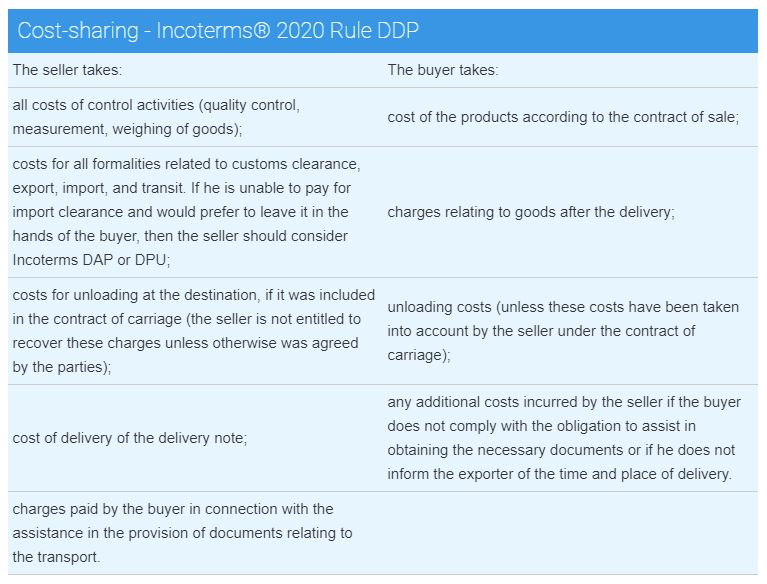DDP - Delivered Duty Paid - Incoterms® 2020 Rule
Article 10 in our series of Incoterms® 2020 – In each article we will identify the responsibilities of the seller and buyer in the transaction at different points in the shipping journey.
What are Incoterms used for?
Incoterms® are primarily used for determining how the sale of equipment for delivery across international boundaries will be handled and who will pay for what in the transaction. They will not address the consequences of a breach of contract or exemptions of liability. Incoterms® relate to the terms between the exporter and importer.
Incoterms® cover the following broad points
Delivery – Incoterms® 2020 specify when seller delivers to buyer
Risk – Incoterms® 2020 specify when risk transfers from seller to buyer. Risk passes from seller to buyer when seller has fulfilled his obligation to deliver the goods
Costs – Responsibility of costs passes from seller to buyer at a point up to which the seller is obliged to pay transport (and insurance) costs
Our ninth Incoterm® is DDP: Delivered Duty Paid – Incoterms® 2020 Rule
The seller delivers the goods when the goods are placed at the disposal of the buyer, cleared for import on the arriving means of transport ready for unloading at the named place of destination.
The seller bears all the costs and risks involved in bringing the goods to the place of destination. They must clear the products not only for export but also for import, to pay any duty for both export and import and to carry out all customs formalities.

What are the obligations of the seller?
- The seller is obliged to deliver the goods and all necessary documents to a destination agreed upon by both parties and at a specified date (the documents may be in paper or electronic form),
- He must properly pack and label the goods so that they can be transported (unless the parties have agreed otherwise in advance),
- The seller must provide the buyer with all the information/documents required to enable the buyer to take delivery of the goods.
What are the obligations of the buyer?
- He is obliged to collect the goods,
- The buyer is not obliged to conclude the insurance contract, but must provide the seller (at his request) the information he needs to obtain insurance,
- The buyer is obliged to assist the seller (at his request) in obtaining all documentation related to import, export and transit,
- If both parties agree that the buyer is obliged to determine the time and place of delivery, he must also notify the seller in advance.
Delivery of goods
It is recommended that the parties precisely specify the destination of the shipment. There are several reasons:
- The risk of loss or damage of the goods passes to the buyer exactly from the moment the products are delivered to the agreed place. Buyers and sellers must be clear when and where the risk is taken over,
- Until the goods are delivered, all costs are borne by the seller. From the moment the goods are delivered, the buyer bears all costs. It is equally important to know when the replacement takes place,
- The seller must conclude a contract and arrange the transport of goods to the designated destination. If he does not do so, he violates the DDP rules and be liable to the buyer for all his losses.
Insurance of the goods on Incoterms 2020 DDP
The seller is not obliged to the buyer to conclude the insurance contract. The buyer also has no such obligation. However, the buyer must provide the seller (at his request) information about the risks and costs that are needed to obtain insurance.
Incoterms 2020 DDP in transport
The DDP 2020 rules can be applied to all modes of transport. Also, it can be implemented in more than one mode of transport.
DDP 2020 and other Incoterms rules
Using Incoterms DDP, the seller has the greatest responsibility. This rule is often misinterpreted.
Important points to note
The seller arranges for transportation through a carrier of any kind and is responsible for the cost of that carrier as well as acquiring customs clearance in the buyer’s country, including obtaining the appropriate approvals from the authorities in that country. Also, the seller may need to acquire a license for importation. However, the seller is not responsible for unloading the goods.
The seller’s responsibilities include providing the goods, drawing up a sales contract and related documents, export packaging, arranging for export clearance, satisfying all import, export, and customs requirements, and paying for all transportation costs including final delivery to an agreed-upon destination.
The seller must arrange for proof of delivery and pay the cost of all inspections and must alert the buyer once the goods are delivered to the agreed-upon location. In a DDP transaction, if the goods are damaged or lost in transit, the seller is liable for the costs.
DAP vs DDP
A similar Incoterms® rule is DAP, which stands for “delivered at place.” It is important to know the difference between DAP and DDP.
Just like with DDP, under DAP the seller has responsibility for getting the goods all the way to the named place. However, DAP gives the buyer one key responsibility: sorting out the import process once it has arrived at the destination country’s port or terminal.
This is a very important distinction. Import formalities can sometimes get complex and require detailed knowledge of the importer’s particular country’s rules and regulations. Many sellers will not be in a position to provide all the necessary information themselves – at least, not without incurring delays and extra costs.
This is one of the key problems with DDP, and a reason why DAP may be preferred instead. Often, the buyer will be better placed to handle import customs formalities.

